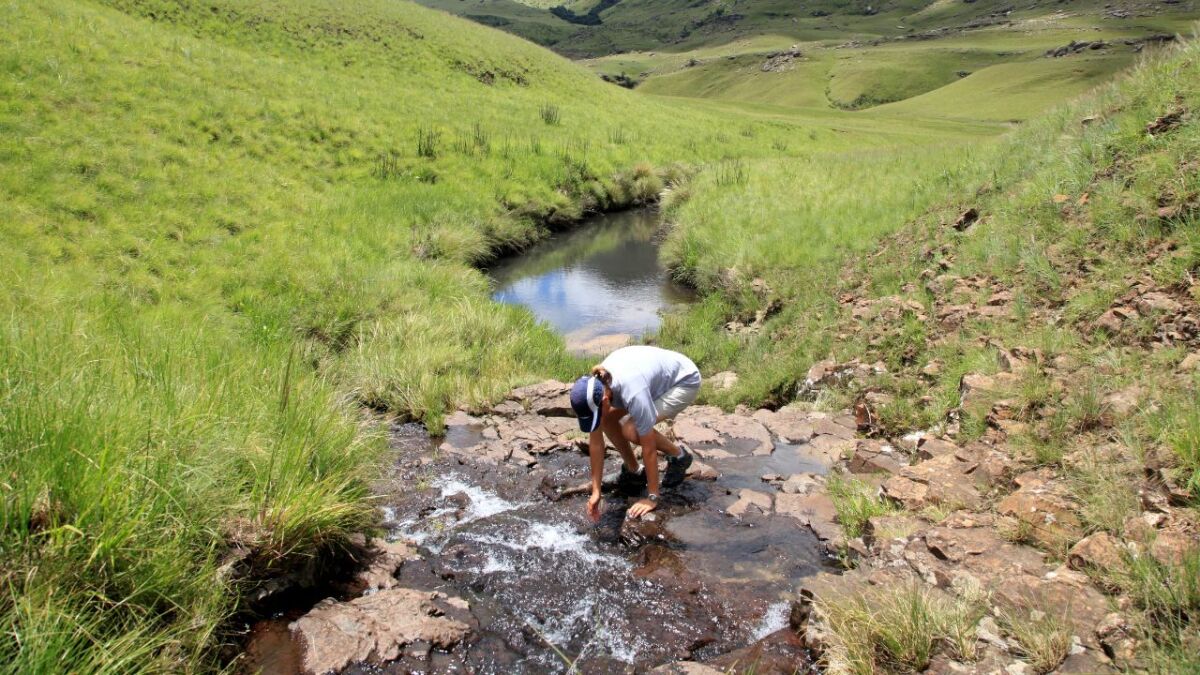
thirst
Nomen
Meaning
Thirst is the intense sensation of needing to drink fluids to quench your body's dehydration. In the context of survival, thirst becomes a critical factor as it can lead to severe health issues and even death if not addressed properly. When venturing into the wild, it is crucial to stay hydrated by drinking enough water and avoiding activities that can increase fluid loss. Understanding the signs of dehydration and having the knowledge to find and purify water sources are essential skills for any outdoor enthusiast. Remember, staying hydrated is key to maintaining your physical and mental well-being in the wilderness.

Examples
„I'm an expert in wilderness survival, and one of the most important things to know is how to quench your thirst. When you're out in the wild, finding clean water can be a challenge.“
„"I'm so thirsty, I need to find a water source as soon as possible," my friend said as we hiked through the hot desert.“
„As we set up camp near a river, my brother exclaimed, "I can't wait to drink from this crystal-clear water and satisfy my thirst!"“
„"I always carry a water filter with me when I go hiking," my experienced survivalist friend advised. "It's essential for staying hydrated and avoiding dehydration."“
„After hours of trekking through the dense forest, I felt my throat getting dry. "I need to find a stream or a natural spring to quench my thirst," I thought to myself.“
„Finally, as I stumbled upon a small pond, I eagerly cupped my hands and took a long, refreshing drink, relieving my thirst.“
Origin
The word "thirst" originates from the Old English word "thyrstan" which means "to be thirsty". It has its roots in the Germanic language family, specifically the West Germanic branch. The word has evolved over time and has remained relatively unchanged in its meaning.
Thirst is a basic human sensation and refers to the feeling of needing to drink fluids to quench one's dehydration. It is a natural response to the body's need for water and is essential for survival. Throughout history, humans have developed various methods to satisfy their thirst, including finding and collecting water from natural sources such as rivers, lakes, and springs.
In the context of survival and outdoor activities, understanding and managing thirst is crucial. Knowing how to find and purify water in the wilderness, as well as recognizing the signs of dehydration, can be life-saving skills. Thirst is often used as a metaphor for desire or longing, emphasizing the importance of water not only for physical well-being but also for emotional and spiritual fulfillment.
Synonyms
Dehydration, Dryness, Parchedness, Craving, Longing, Desire, Need, Hankering
Antonyms
Satiated, Hydrated
Relatives
Dehydration, Water, Hydration, Drinking, Quench, Parched, Dry, Moisture
Historical and cultural importance
Thirst is a primal sensation that has been deeply ingrained in human history and culture. Throughout the ages, the quest for water has been a fundamental aspect of survival, shaping the way societies have developed and interacted with their environment.
In ancient civilizations, the availability of water sources determined the location of settlements and the success of agricultural practices. The Nile River, for example, played a crucial role in the development of ancient Egypt, providing water for irrigation and transportation.
Thirst has also been a central theme in religious and spiritual practices. Many cultures have rituals and ceremonies centered around water, symbolizing purification, renewal, and the quenching of spiritual thirst. Water is often seen as a life-giving force, connecting humans to the natural world and the divine.
Explorers and adventurers throughout history have faced the challenge of thirst in their quests for new lands and discoveries. From the parched deserts of the Sahara to the vast oceans, the search for water has pushed the limits of human endurance and resourcefulness.
In modern times, the importance of staying hydrated is emphasized in various fields, including sports, health, and emergency preparedness. Understanding the physiological effects of thirst and the importance of water conservation is essential for survival in extreme conditions.
Thirst is not just a physical sensation; it is a symbol of our connection to nature and our basic need for sustenance. It reminds us of our vulnerability and the importance of water as a precious resource. By understanding the historical and cultural significance of thirst, we can better appreciate its role in our lives and the survival skills needed to quench it.
More information about the term thirst
Thirst: The Unquenchable Desire
Thirst, the primal sensation that drives us to seek hydration, is an essential aspect of survival in the wilderness. As a seasoned outdoorsman, I have experienced the relentless grip of thirst and understand its significance in the art of survival. In this article, we will explore the physiological and psychological aspects of thirst, as well as practical tips to quench it in the wild.
The Physiology of Thirst
Thirst is the body's way of signaling dehydration. When we lose fluids through sweating, breathing, and other bodily functions, our blood becomes more concentrated, triggering the release of a hormone called vasopressin. This hormone stimulates the thirst receptors in our brain, compelling us to seek water.
When you find yourself in a survival situation, it is crucial to recognize the signs of dehydration. Symptoms such as dry mouth, dark urine, fatigue, and dizziness indicate that your body is in dire need of water. Ignoring these signs can lead to severe consequences, including heatstroke and organ failure.
Quenching Thirst in the Wild
When water sources are scarce, it is essential to know how to find and purify water to satisfy your thirst. Here are some practical tips:
1. Locating Water Sources: Look for signs of water such as animal tracks, vegetation, and low-lying areas. Digging a hole in a dry riverbed or collecting dew from plants can also provide a source of water.
2. Purifying Water: Drinking untreated water in the wild can lead to waterborne illnesses. Boiling water for at least five minutes, using water purification tablets, or filtering it through a cloth or improvised filter can help remove harmful bacteria and parasites.
3. Conserving Water: In survival situations, every drop counts. Avoid excessive sweating by resting during the hottest parts of the day and wearing appropriate clothing to regulate body temperature. Additionally, ration your water intake and avoid activities that cause unnecessary water loss.
The Psychological Battle
Thirst not only affects us physically but also mentally. The constant desire for water can be overwhelming, leading to anxiety and impaired decision-making. It is crucial to stay calm and focused, as panic can cloud your judgment and hinder your chances of finding water.
Engaging in mindfulness techniques, such as deep breathing and positive visualization, can help alleviate the psychological burden of thirst. Remember to stay positive and maintain a proactive mindset, as this will increase your chances of survival.
Conclusion
Thirst, the unquenchable desire for water, is a fundamental aspect of survival in the wild. Understanding the physiological and psychological aspects of thirst is crucial for any outdoor enthusiast. By knowing how to locate and purify water sources, conserving water, and maintaining a positive mindset, you can conquer the challenges posed by thirst and increase your chances of survival in the wilderness.
Back to overview

